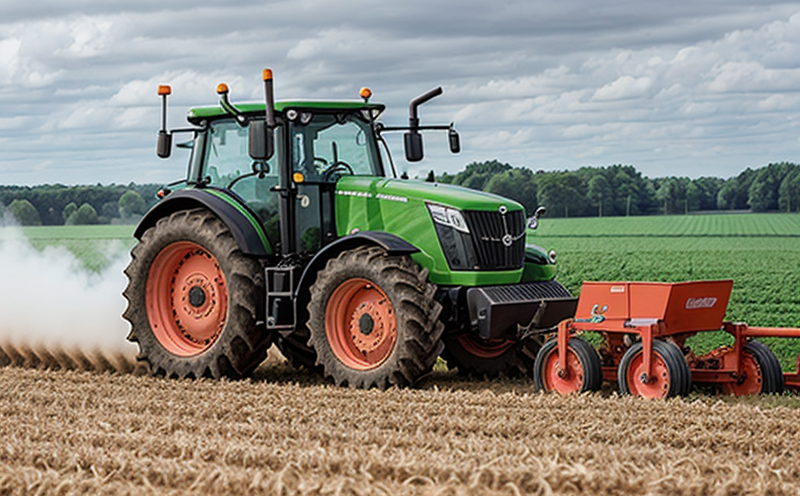Post-Harvest Machinery Safety Testing
In the agriculture and forestry sector, post-harvest machinery plays a critical role in ensuring efficient handling of crops after harvest. This machinery includes combines, threshers, grain dryers, and other equipment designed to process harvested produce with minimal damage. Ensuring these machines are safe for operation is paramount to protecting both workers and equipment integrity.
The safety testing of post-harvest machinery involves a series of rigorous checks that focus on the mechanical components, electrical systems, and overall operational environment. The primary objective is to ensure that all parts comply with international standards such as ISO 12100:2010 for risk assessment and safety of machines. These tests are crucial in preventing accidents and ensuring compliance with local regulations.
Our post-harvest machinery safety testing service includes a comprehensive evaluation process that covers multiple aspects:
- Mechanical Integrity: Inspection of all mechanical components for signs of wear, corrosion, or damage. This ensures the machine operates within expected performance parameters.
- Electrical Safety: Testing of electrical systems to ensure they meet safety standards and are free from potential hazards such as short circuits or overloads.
- User Interface: Evaluation of controls, displays, and other user interfaces for ease of operation and compliance with ergonomic guidelines.
During the testing process, we also perform a detailed analysis of the operational environment. This includes assessing the working conditions under which the machinery will be used to ensure they are safe and do not pose undue risks to operators. Additionally, our experts review maintenance procedures and recommend best practices for prolonging equipment lifespan and enhancing safety.
The results of these tests provide critical data that can influence product design improvements, enhance operational efficiency, and reduce downtime due to accidents or mechanical failures. Compliance with international standards ensures not only the safety but also the reliability and longevity of the machinery in use.
Why It Matters
The importance of post-harvest machinery safety testing cannot be overstated, especially considering the high volume of agricultural products processed by these machines. Unsafe machinery can lead to serious accidents, resulting in injuries or even fatalities. In addition, non-compliance with industry standards could result in financial penalties and reputational damage for manufacturers and operators.
By investing in thorough safety testing, entities can demonstrate a commitment to worker safety and regulatory compliance. This not only protects their workforce but also enhances the overall quality of agricultural products by ensuring efficient and reliable processing equipment. Furthermore, adhering to best practices ensures that machinery operates at optimal performance levels, reducing maintenance costs and extending the life cycle of expensive equipment.
Our testing services are designed to meet the specific needs of agriculture and forestry sectors, providing insights into potential hazards and offering actionable recommendations for improvement. This proactive approach helps businesses stay ahead of regulatory changes and market demands, ensuring they remain competitive in a dynamic industry.
Scope and Methodology
The scope of our post-harvest machinery safety testing service is comprehensive, covering all aspects relevant to the operation and maintenance of agricultural machinery. We employ state-of-the-art equipment and follow internationally recognized standards such as ISO 12100:2010 for risk assessment.
Our methodology begins with a thorough inspection of the machine’s mechanical components, including but not limited to:
- Wheels and tires
- Moving parts such as conveyors and belts
- Hydraulic systems
We then proceed to electrical system checks which involve:
- Testing insulation resistance
- Checking for potential fire hazards
- Assessing grounding and bonding integrity
User interface evaluation is another critical component of our service, focusing on:
- Control panel layout
- Display clarity and readability
- Ergonomic design for operator comfort
The operational environment assessment includes evaluating:
- Working conditions such as temperature, humidity, and dust levels
- Potential exposure to harmful substances
- Risk factors associated with specific tasks performed by the machinery
We also provide recommendations for enhancing safety measures based on our findings. These may include modifications to existing designs or implementation of additional safety features.
Customer Impact and Satisfaction
Our post-harvest machinery safety testing service has significantly impacted the operations of numerous agriculture and forestry businesses by enhancing their safety protocols and operational efficiency. By ensuring compliance with international standards, we help customers avoid costly fines and potential legal issues.
Many of our clients report increased worker satisfaction due to safer working conditions. This is complemented by improved product quality resulting from efficient machinery operation. Our comprehensive reports provide valuable insights that aid in continuous improvement processes within their organizations.
Customer feedback has consistently praised our expertise and professionalism throughout the testing process. We pride ourselves on delivering accurate, reliable results that contribute to long-term business success. Our services are tailored to meet the unique challenges faced by each client, ensuring they receive the highest level of care and attention.





